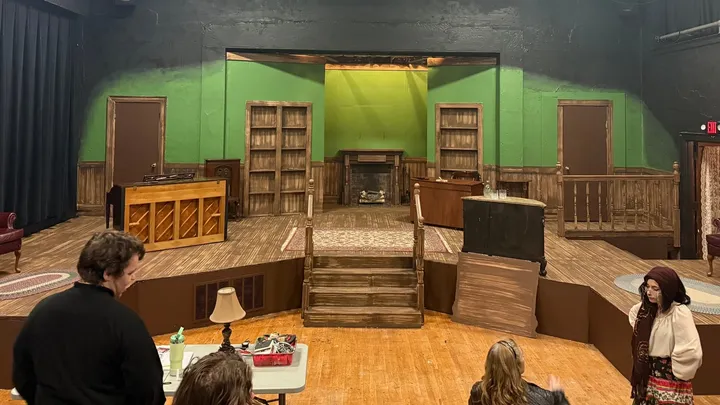Dance to the music: 'A Jukebox for the Algonquin' at ICTRep
Set in a senior living facility, the stories and songs of this laugh-out-loud romp touch on dreams and fears universally shared.

ICTRep opens its third season with Paul Stroili’s play “A Jukebox for the Algonquin.” Since its 2023 debut at Michigan’s Purple Rose Theatre, it has been produced by a handful of regional companies. Its popularity is likely to continue given that the plot, characters, and themes align with the massive Baby Boomer generation. This consumer bloc gets whatever it wants — including senior living communities that cater to rather than infantilize its residents.
Not to say that “Jukebox” won’t thrive after the Boomers have finally slouched off this mortal coil, because its messages about community, dignity, and mortality are timeless.
Also, it’s hilarious.
Set in the early 2000s, the story is straightforward: Placid Pines, a retirement community in upstate New York, is one of those sprawling campuses that house elders based on their level of need — independent housing, assisted living, or long-term care. In the “Algonquin Room,” increasingly shabby compared to shinier developments on the campus, long-timers Annie (Betsy Dutton), Dennis (Shaun-Michael Morse), and Johnny (David Williams) have staked a claim.
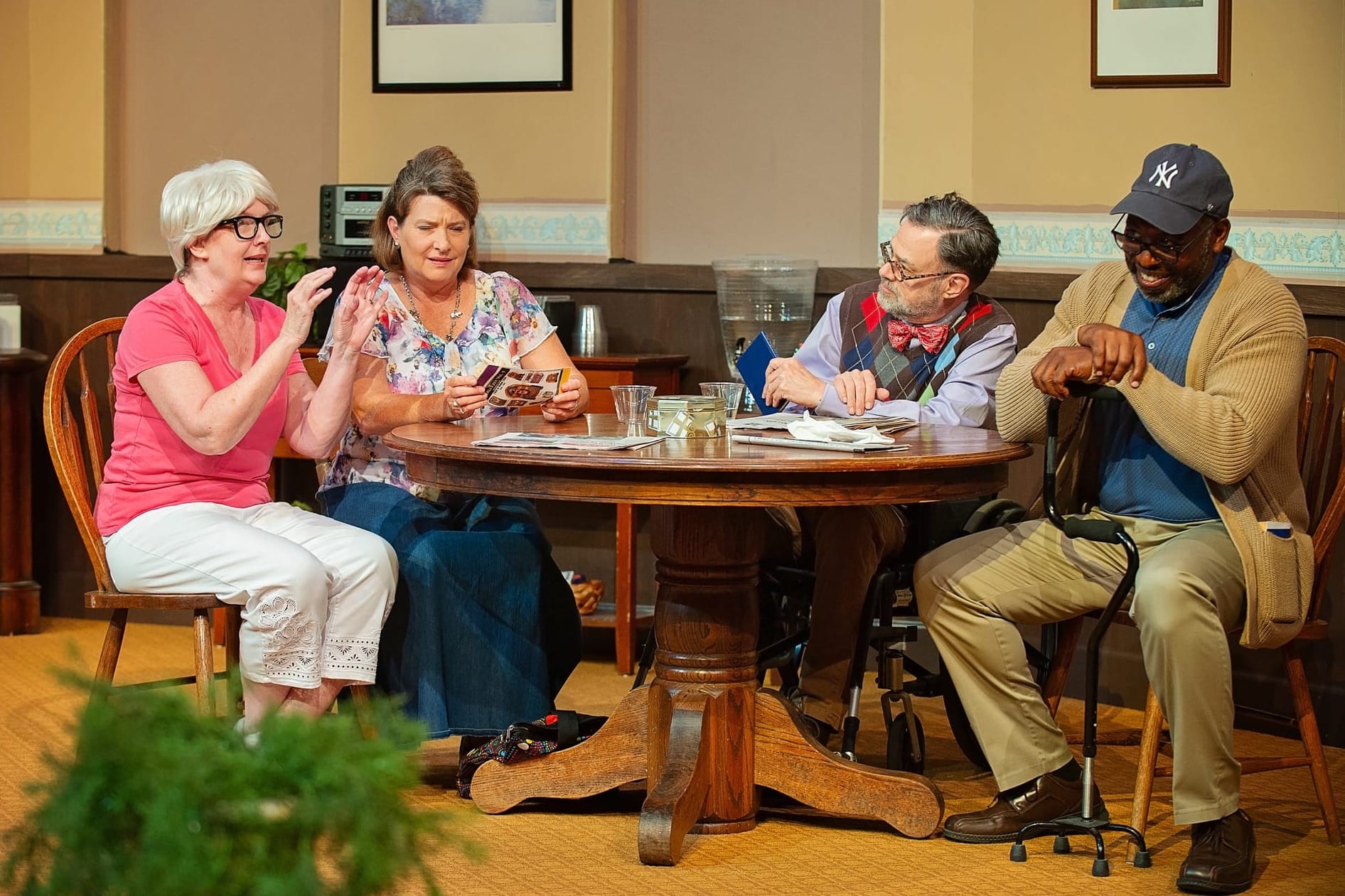
The source of the room’s name is the group of bon vivants — including Dorothy Parker, Harpo Marx, Edna Ferber, and Robert Benchley — who met daily at the bar in New York City’s Algonquin Hotel in the 1920s to hurl quips and exchange drunken musings. A book about the group sits prominently in their namesake’s room at Placid Pines, where the friends share companionship, tell stories of their lives in their New York boroughs, and nurse dreams.
Our free email newsletter is like having a friend who always knows what's happening
Get the scoop on Wichita’s arts & culture scene: events, news, artist opportunities, and more. Free, weekly & worth your while.
No spam. Unsubscribe anytime.
Johnny’s dream keeps him engaged: he’s raising funds to get a jukebox that will hold “thirty-six records — seventy-two songs,” a mantra he utters with the shiny-eyed devotion of a cleric. The going is slow: Their domain’s manager, Josefina (Maya Arana) has priced the machine at $3,000, far more than the $400 he’s scraped together.
Into this clique of “longhorns,” as they call themselves, enters Peg (Michele Janssens), an “indie” who has just purchased a place. Its recently deceased former owner was an old hippie who “came up for Woodstock and just stayed.”
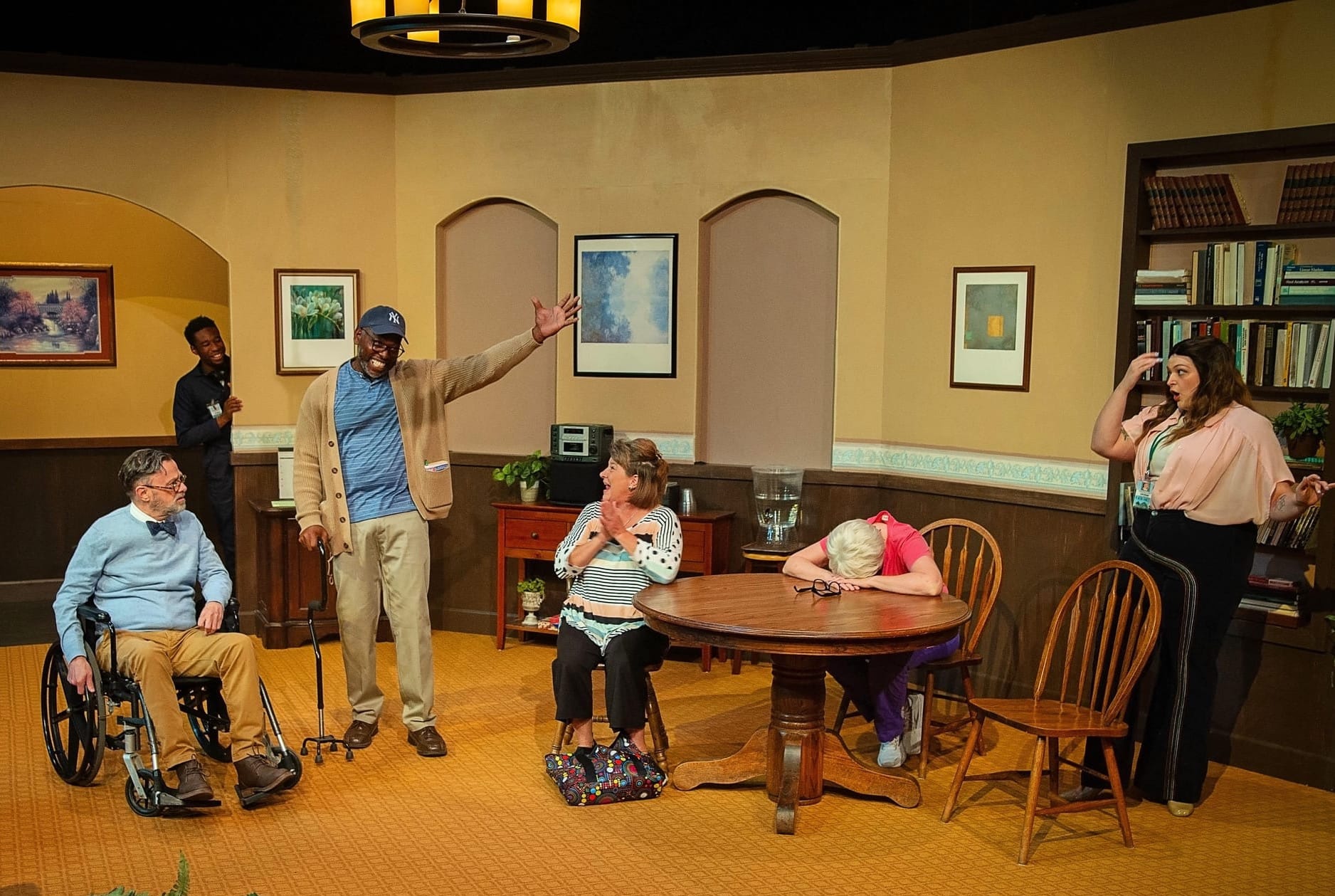
The play opens with a snappy expository scene that sets the bar for laughs at maximum: a woman with a clipboard gives a prospective resident a tour of the facility, lacing her descriptions with such antisemitic barbs that the woman leaves in a huff. We’re roaring before we even know any of the characters’ names. From there it’s a steady stream of set-ups and deliveries that, for the most part, avoid cliches or Hallmark sentiment.
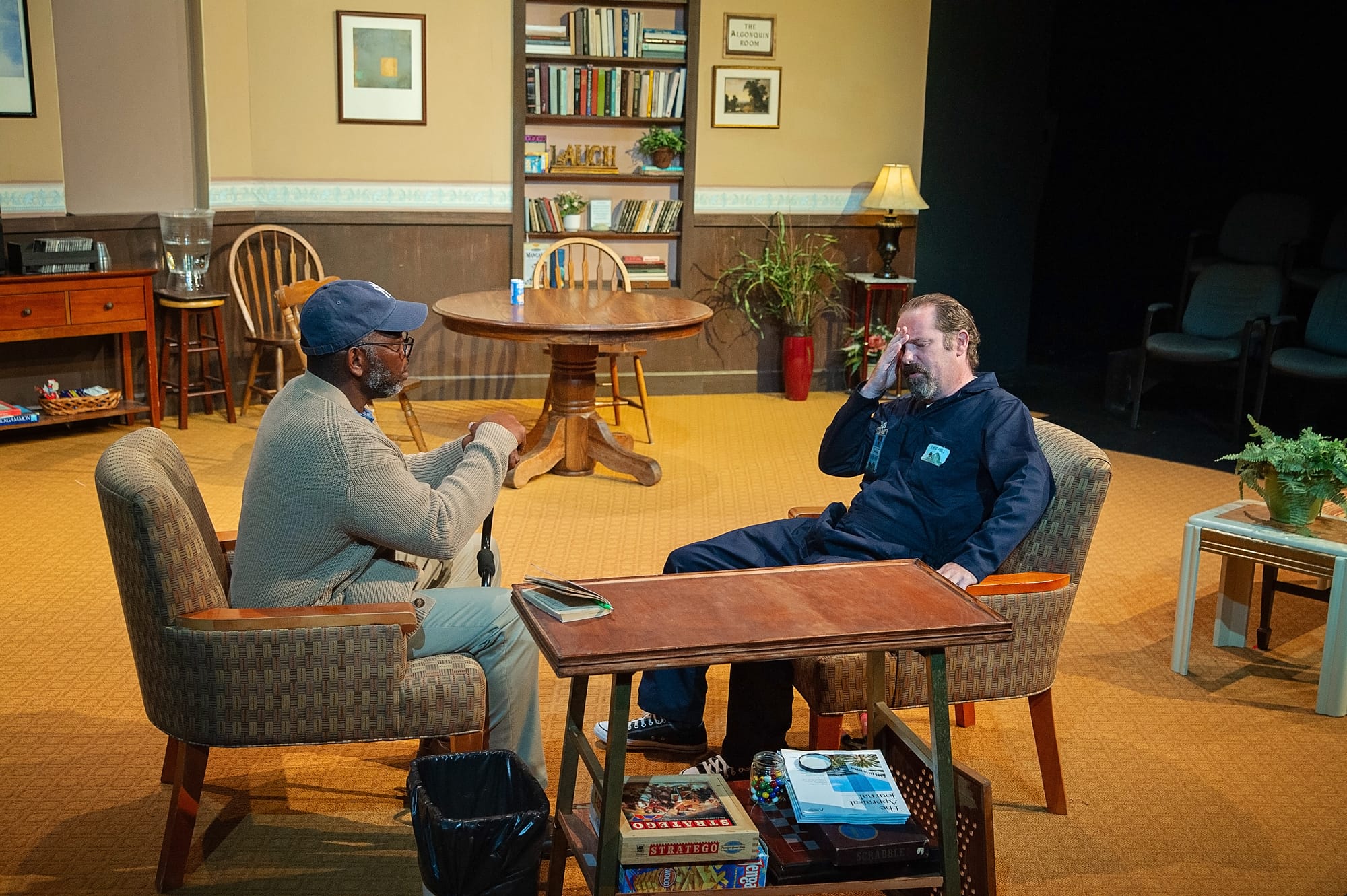
The script’s second act, in which desolation joins the comedy, is less effective but still worthy theater. Most of the play’s round-robin of sad monologues occurs here, most notably by new custodian Chuck (Bryan Welsby), whose career shift hinges on a tragic incident. Near the play’s close, Morse’s wheelchair-bound Dennis morosely philosophizes, flask of whiskey at hand. Both Welsby and Morse demonstrate their considerable acting skills in speeches that hover precariously close to maudlin. Thanks to their restraint (as well as, presumably, directorial guidance), the stories are effective.
Janssens’ Peg also offers her backstory — only 57, she has fled here from a long marriage she abruptly realized was emotionally abusive. Williams’ Johnny, despite his gregarious nature, holds details about his past close to his chest. Dutton’s Annie gets short close-ups, too, including a charming explanation of her legally blind status. Even custodian Tyler (Torey Wilson) has a monologue, but his is jolly: a slightly bawdy description of his assault by a horny resident.

Julie Longhofer’s direction of this capable cast is strong and even. In comic scenes she keeps actors from slipping into broad schticks grasping for cheap laughs. Her pacing powers the roughly two-hour production, which flies by but feels unhurried. Sets and costumes — the latter by Julie, the former by herself and Stan Longhofer — inject color and detail, with clothing styles that reflect each player’s nature. Stan Longhofer’s lighting is effective, particularly in a dream scene near the end. Kirk Longhofer’s sound injects another layer of comedy: chipper loudspeaker updates about resident activities of the day, always including the date and the year for the memory-challenged.
About that capable cast: I would have preferred an ensemble curtain, because each actor contributed generously to the production’s success. Notable among them are Arana, as the staffer who must herd her gently rebellious flock. Hers is perhaps the show’s most interesting character, suffused with a mixture of compassion and professionalism that we all pray for when dealing with authorities. Arana creates in Josefina a charming force for good who gets to deliver, at the play’s heartbreaking climax, the strongest of the monologues because it is directly story-driven. She dispenses her work with fire and tears; packets of hankies rustled on opening night.
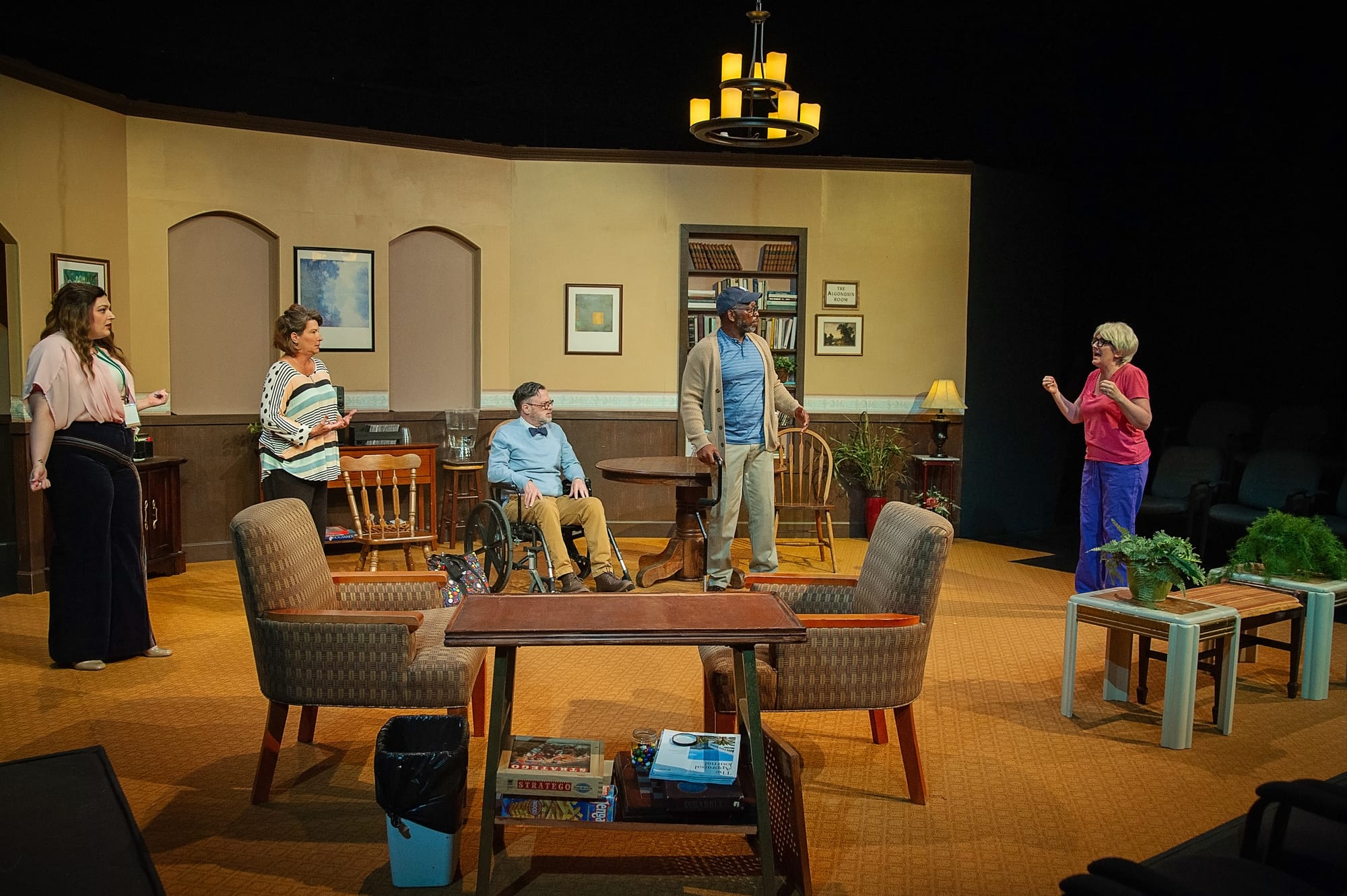
Williams, as Johnny, delivers his lines with assurance and panache, although his physicality as an aging, failing elder is less assured than his comic delivery.
Welsby slips into his difficult role like a hand into a glove: His character undergoes rather substantial shifts considering that it isn’t the lead. Chuck is a sort of prism who changes as we learn more about him and as he better understands the job and its people. Welsby is, as usual, a steady and strong craftsman. Chuck is likeable, part of the story, a three-dimensional but not overwhelming individual alongside the more central characters.
Michele Janssens, always strong on stage no matter the role, builds a loveable, mischievous character. (She also entertains mightily in the opening scene as the snooty potential resident.)

Morse — often featured in big splashy roles that allow him to strut his skills as both actor and singer — excels in a tonally different kind of character, a small, ordinary man whose delicate humor is delivered with a light touch utterly lacking in snark. Finally, Betsy Dutton, in the enviable role of Annie (she’s got, by and large, the best lines), entertains heartily, with a deft comic touch flavored with dimension and weight. Dutton has recently retired from a long high-school teaching career, and her former school’s loss is Wichita theater audiences’ gain.
The Details
"A Jukebox for the Algonquin"
August 15-24 2025, at Welsbacher Theatre in the Hughes Metropolitan Complex, 5015 E. 29th St. N. in Wichita
Shows are 7:30 p.m. Fridays and Saturdays and 2 p.m. Sundays.
General admission tickets are $35. Discounts are available for students, seniors, veterans, and audience members under 30.
Entrance to the theater is through Door F only that is located on the southeast side of the building.
The theater can reserve seats for those with mobility issues. To inquire about this, email info@ictrep.org or call 316-612-2543 and inform them of the date of your tickets and what kind of accommodations you will need.
Anne Welsbacher writes plays, fiction and nonfiction, and book and theater reviews. She can be found on Substack and Bluesky. She is the Performing Arts Editor for this publication. awelsbacher.com
❋ Derby man has the kind of voice that turns heads — and chairs
❋ Socializing while sober: how some Wichitans are cultivating alcohol-free communities
❋ As a small creative business closes, the owner mourns
❋ Painting through it: Autumn Noire on 20 years of making art
❋ How a guy from Wichita resurrected 'Dawn of the Dead'
❋ Bygone Friends University museum housed curious collections
Support Kansas arts writing
The SHOUT is a Wichita-based independent newsroom focused on artists living and working in Kansas. We're partly supported by the generosity of our readers, and every dollar we receive goes directly into the pocket of a contributing writer, editor, or photographer. Click here to support our work with a tax-deductible donation.



